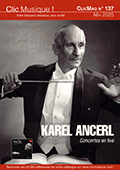|
C’est un peu au bout de sa voix que Thomas Oliemans nous offre ce Winterreise dépouillé de timbre, un peu gris sans que le piano très neutre de Paolo Giacometti l’aide beaucoup, même lorsqu’il devrait porter un aigu difficile. Et c’est dommage vraiment, car ce Papageno, ce Figaro, ce Guglielmo, met beaucoup d’art à narrer tout ce qui ici décrit, et les paysages et les tourments de l’âme, mais voila il nous parle son Winterreise alors qu’il pourrait encore nous le chanter absolument, même y venant trop tard déjà. C’est triste décidément, mais j’écoute l’artiste qu’il est, que l’on voit clairement à mesure que les ombres gagnent le voyage, saurez-vous l’entendre vous aussi ? (Jean-Charles Hoffelé)  When I was a child, a number of volumes in my father’s bookcase, too thick and doubtlessly too difficult for me, already exercised an irresistible attraction. They cried out to me from the shelf: intriguing titles which promised a magic mountain, something about a hundred years, loneliness and searching for lost time. I started to read many of them too early, I got through some with goose flesh, while others forced me to throw in the towel in despair. In music I had a predilection for heavy symphonies, huge gestures and extensive forms, and I hunted down repertoire and sound worlds that were new to me. (...) In my hunger to discover repertoire as yet unknown to me, one day I came across ‘Winterreise’ in the first volume of the Peters edition of Schubert songs. The title intrigued me straightaway, just as much as those books, but it seemed equally unapproachable. (...) As each year passes it has become a work to turn back to again, to measure myself against, to immerse myself in; what is more, as soon as the hurdy-gurdy man has turned his handle for the last time, it seems to invite me to open the score once more at page one and try yet again to conquer this magic mountain of the lied repertoire.
 |
